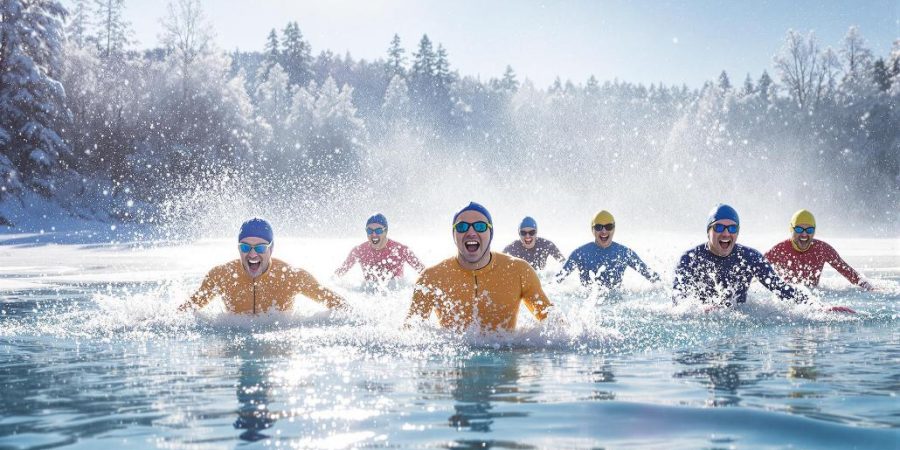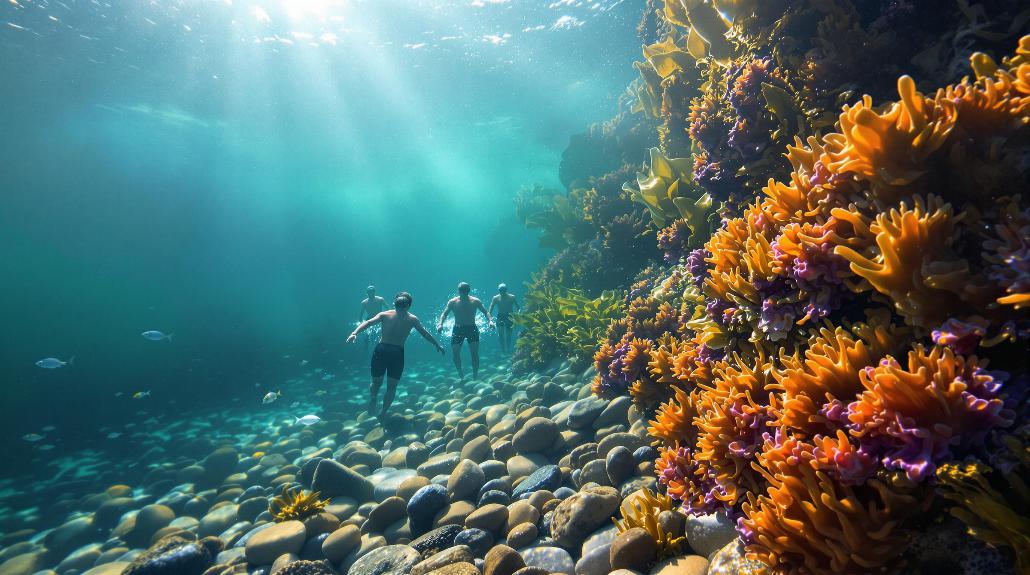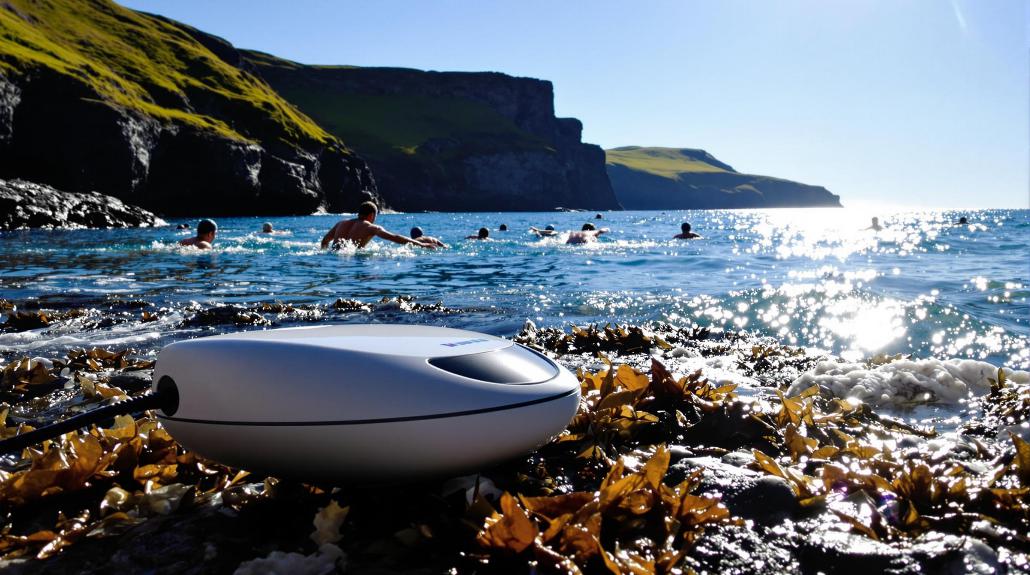I've often found myself intrigued by the relationship between cold water swimming and our immune response. It seems that this brisk activity not only invigorates the body but also triggers a series of physiological changes that could enhance our immune function. As I investigate the science behind this phenomenon, I can't help but wonder how regular exposure to cold water could prepare our bodies to better combat illness. What specific mechanisms are at play here, and how might they impact our overall health? Let's uncover the details together.
Key Takeaways
- Cold water exposure enhances immune function by activating T-lymphocytes, B-lymphocytes, and natural killer cells, which are key components of the immune system.
- Regular cold immersion increases white blood cell counts, contributing to improved immune responses and resilience against infections.
- The cold shock response triggers the release of cortisol and adrenaline, further boosting the efficiency of the immune system post-exposure.
- Cold water swimming can reduce chronic inflammation by constricting blood vessels, limiting the influx of inflammatory cells, and easing muscle soreness.
- Participants in cold water swimming report fewer colds and improved overall fitness, highlighting its potential for enhancing immune health.
Immune System Enhancement
In terms of enhancing our immune systems, cold water swimming offers a unique and effective approach. Seriously, it might sound wild, but jumping into chilly water can give your immune resilience a real boost. Ever heard of the cold shock response? It's like your body's alarm system, kicking your immune system into high gear as it treats that sudden drop in temperature as a potential threat.
Here's the scoop:
- Cold exposure causes your lymph vessels to contract, making them more efficient.
- Your white blood cells? They're on high alert, ready to fend off any nasty germs lurking about.
- Studies even show improved T-lymphocyte and B-lymphocyte activation—essentially, your immune system's A-team. Additionally, regular cold exposure has been linked to increased white blood cell counts, bolstering your body's defense against infections.
Now, don't get me wrong; I'm not saying you should plunge into an ice bath tomorrow. Start slowly, with short dips, and allow your body to acclimatise.
Trust me, it'll thank you later.
Mental Health Benefits
Cold water swimming isn't just about enhancing your immune system; it can also work wonders for your mental health. Seriously, after a dip, I often feel like I've just chugged a gallon of positivity. That immediate mood improvement is hard to ignore.
Here's what I've noticed:
- Endorphin Rush: The cold triggers a wave of beta-endorphins, giving me that lovely "high" post-swim. It's like a free therapy session, minus the couch.
- Stress Reduction: Regularly splashing in chilly waters has genuinely helped me reduce my stress levels. Who knew that freezing my toes off would enable me to tackle life's craziness with a smile? This is likely due to the reduction in cortisol levels that occurs after immersion, enhancing my ability to manage stress.
- Community Vibes: Joining a cold water swimming group? It's not just about the swim; it's about the connection. We share laughs, stories, and the occasional gasp when we hit that icy water together.
Physical Health Benefits
You know, when I first jumped into cold water, I thought I was just signing up for a frosty shock to the system.
But, surprise! It turns out that this chilly plunge does wonders for my blood circulation, helps reduce inflammation, and even gives my metabolism a nice little boost. Additionally, it significantly boosts the immune system by increasing the production of white blood cells, which can help fend off those pesky winter colds.
If I can trade a few shivers for feeling great, why not, right?
Enhanced Blood Circulation
Improved blood circulation is one of the extraordinary benefits of cold water swimming that I've personally experienced. Seriously, who knew that jumping into frigid water could actually enhance my blood flow? It's like my body's very own circulatory training session.
When I take that plunge, my arteries and veins perform this incredible dance—dilating and constricting, increasing blood flow to those cold areas. It's not just about feeling alive; it's about purging toxins and improving my healing.
Here's the kicker: improved blood flow doesn't just make me feel great; it also elevates my cognitive function and heart health. I can almost hear my heart saying, "Thanks for the workout!" Regular exposure to cold water can lead to long-term circulatory benefits that further support overall cardiovascular health.
And let's not forget about recovery. After a tough swim, I notice I bounce back faster. No more feeling like a zombie on the sofa.
Inflammation Reduction Techniques
After experiencing the invigorating effects of improved blood circulation, I found that cold water swimming also plays a significant role in reducing inflammation. Who knew that jumping into icy waters could help manage my soreness? It's like a spa day, minus the warm towels!
When I first started, I learned that the constriction of blood vessels during cold exposure limits inflammatory cells. This means less swelling and, dare I say, a better recovery after those intense workout sessions. Here's a little table to help you visualise:
| Benefits of Cold Exposure | How It Works |
|---|---|
| Reduces Muscle Soreness | Decreases blood flow |
| Provides Pain Relief | Constricts blood vessels |
| Aids Inflammation Management | Stimulates immune response |
I can't stress enough how incredible it feels to emerge from the cold, knowing I'm not just surviving but thriving. Cold exposure activates white blood cells, which helps regulate the inflammatory response. Just remember to start with shorter sessions, like 5 to 10 minutes, and gradually increase your time.
Metabolism Boosting Effects
Cold water swimming can stimulate your metabolism in ways you mightn't expect. Seriously, it's like a secret weapon for your body. When you plunge into chilly waters, your body kicks into high gear, burning calories just to maintain your warmth. You might feel like a human popsicle, but hey, at least you're burning those calories!
Here's how it works:
- Increased Caloric Burn: Your body burns more calories than you might think to keep that cosy core temperature.
- Brown Fat Activation: Yes, the cold actually activates brown fat, which burns calories like there's no tomorrow. Who knew you could have a type of fat that helps you lose fat?
- Basal Metabolic Rate Enhancement: You'll continue to burn calories even after you've dried off, thanks to an increase in your metabolic rate—up to 350%! This increase in metabolism is also linked to improved insulin sensitivity for better sugar management.
Plus, if you stick with it, you'll improve insulin sensitivity. This means your body gets better at managing sugar—goodbye, insulin resistance!
Preparation and Safety
When diving into the exhilarating world of cold water swimming, preparation and safety are essential for an enjoyable experience. Trust me, the last thing you want is to be that person who jumps in without a plan—yikes!
Here's how to get it right:
- Warm-Up: Do some jumping jacks or jog a bit to get your blood pumping. You'll thank me later when you're not shivering like a leaf.
- Pre-Swim Inspection: Always scope out your surroundings. Look for hazards and plan your exit routes. It's not just about the water; it's about being smart, too.
- Gradient Immersion: Don't just cannonball in! Gradually wade in, wetting your face and neck first. It feels less like a polar plunge and more like a gentle hug. This technique helps to reduce cold water shock, allowing your body to adjust more comfortably.
- Emergency Planning: Seriously, think about what could go wrong. Have a phone handy and a buddy system in place—because who doesn't want a partner in crime?
Swimming in cold water can be thrilling, but it's all about being prepared. So grab your gear, buddy up, and let's make some splashy memories!
Mechanisms and Adaptations
Immersing yourself in cold water can reveal a range of fascinating physiological mechanisms and adaptations that enhance your overall health. Trust me, it's not just about screaming like a banshee when you first plunge in!
Here's what happens:
- Physiological Responses: Your body goes into overdrive, releasing cortisol and adrenaline. It's like a wake-up call, but instead of coffee, you're getting a cold splash!
- Adaptive Mechanisms: After repeated cold water exposure, your immune system receives a significant boost. You'll notice increased white blood cells, including those tough natural killer cells. They're like little bodyguards ready to tackle threats. Moreover, regular cold water immersion leads to significant increases in your monocytes and lymphocytes, further enhancing your immune response.
- Improved Circulation: Your blood flow gets redirected to essential organs. So, while you're shivering, your heart's doing a happy dance, improving your cardiovascular health.
Now, let's not forget the mental perks. Cold water swimming can help reduce chronic stress and even improve your mood. Who knew that a little chill could warm up your heart?
Research and Practice
The fascinating physiological adjustments from cold water swimming set the stage for exploring current research and practical applications.
You might think cold exposure is just a quirky fad, but there's more to it.
The research? Well, let's just say it's a mixed bag. While cold water swimmers seem to suffer fewer colds, studies haven't pinpointed why. But hey, who doesn't love a little mystery?
Here's what I've found about cold water swimming:
- Improves fitness levels and metabolism: Your body's calorie burn rate skyrockets.
- Enhances circulation: Blood flow gets redirected to essential organs, keeping you feeling invigorated.
- Reduces stress and anxiety: It's like nature's therapy, minus the hefty price tag.
- Community building: There's nothing like bonding over a shared shiver. Additionally, cold water exposure may prime the immune system, possibly offering enhanced protection against illnesses.
Now, if you're thinking of diving in, remember to take safety precautions.
Enter the water slowly to avoid that exhilarating cold shock. Wear appropriate gear, swim with friends, and limit your exposure time.
Frequently Asked Questions
What Should I Wear While Cold Water Swimming?
When I go cold water swimming, I wear a neoprene wetsuit for insulation and thermal accessories like gloves and caps. Staying warm makes the experience enjoyable, and I always feel a sense of camaraderie with fellow swimmers.
Can Children Participate in Cold Water Swimming Activities?
Absolutely, children can enjoy cold water swimming! Just ensure to follow safety precautions such as supervision and warming up. The health benefits are remarkable, nurturing resilience and confidence while creating lasting memories together.
How Often Should I Swim in Cold Water for Benefits?
I find that swimming in cold water 2-3 times a week really helps me feel invigorated. It's like a refreshing boost to my immune system, and gradually increasing my sessions makes it easier to enjoy the benefits while being part of this community.
Are There Any Age Restrictions for Cold Water Swimming?
In relation to age restrictions for cold water swimming, I always stress the importance of adhering to safety guidelines. Children should ease into it gradually, whilst adults can reap the health benefits; however, it is crucial that we respect individual limits to ensure everyone's safety.
What Are the Best Locations for Cold Water Swimming?
When I think of the best seasonal locations for cold water swimming, I can't help but mention unique cold spots like Lake Wohlen in Switzerland and the Forty-Foot Dip in Dublin. They are exhilarating experiences!
Conclusion
So, there you have it—cold water swimming isn't just for polar bears or those who enjoy torturing themselves! It's an exhilarating experience for your immune system, mental health, and overall fitness. Who knew that plunging into icy waters could rev your body into high gear? Just remember, if I can do it, so can you. Embrace the chill, boost your immune system, and hey, you might just make a splash (pun entirely intended) in your health journey!



